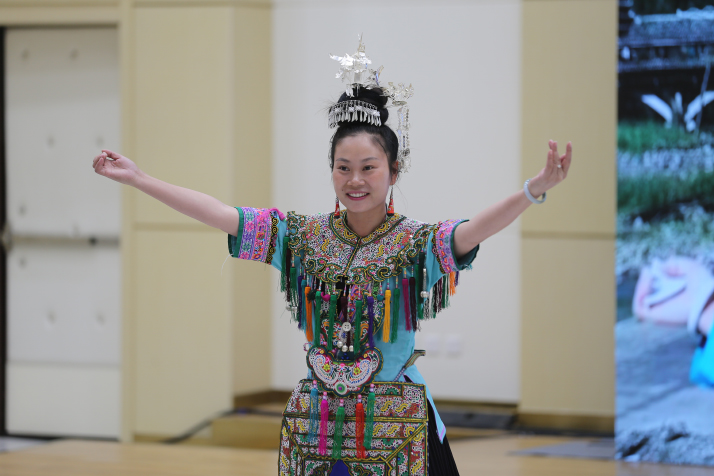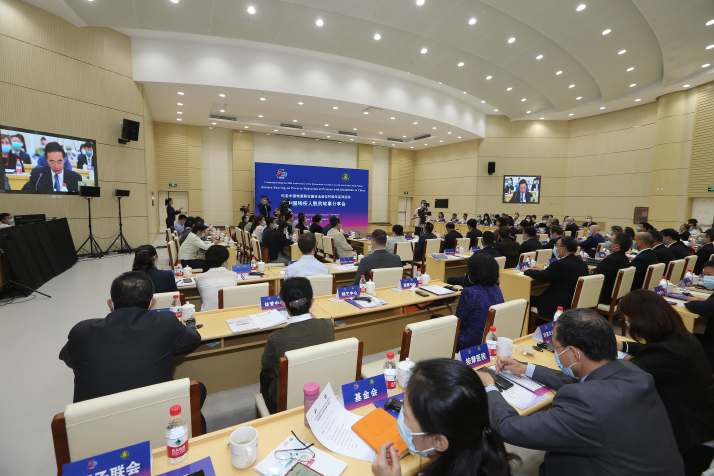| China |
| Seven million people with disabilities in China have moved out of dire poverty over the past five years | |
|
|
 Lu Yongjiang models traditional clothing of the Dong ethnicity, of which she is a member, at an event hosted by the China Disabled Persons' Federation (CDPF) on September 29 in Beijing (COURTESY PHOTO)
When the car crash that changed the course of her life happened in April 2011, Yang Shuting was just about to embark on her career as a nurse at a local hospital in Hunan Province. Waking up in a daze, she found herself in intensive care. Not long after, doctors told Yang that the accident had left her with high paraplegia, rendering her unable to move from the chest down.
After a period of just sitting in her wheelchair, wondering what to do with her life, she turned to the online world for inspiration. "I noticed that both the domestic and international markets for artificial flowers were huge," Yang said. "And so, in 2014, with a group of physically challenged friends, I set up a handicraft store on Taobao (one of the largest online shopping platforms in China)." Yang recounted her business experience at an event for people with disabilities to share stories of poverty reduction, hosted by the China Disabled Persons' Federation (CDPF) on September 29 in Beijing. Living up to full potential Gewu Village of Baimaoping Town, where Yang was born, is located in a remote area of Chengbu Miao Autonomous County in Hunan. Due to the geographical conditions and limited access by road, villagers have no sources of income besides growing and selling grain or leaving to work elsewhere. After making her first small fortune and paying off her debts, Yang registered a cooperative in May 2015, and signed a cooperation agreement with more than 200 poor families. The cooperative provided semi-finished artificial flowers for the villagers to assemble at home, and then collected and sold the flowers, distributing the proceeds among the families. After that, Yang established 22 flower assembly agencies and two poverty alleviation workshops, hiring more than 400 employees, each with a monthly income of 2,000 to 4,000 yuan ($310-$620). China fully respects the dignity of persons with disabilities, works hard to tap into their potential and empower them, and fully recognizes their important role in leaving poverty behind, Xia Gengsheng, deputy head of the National Administration for Rural Vitalization, said at the event. "I was supported by the local authorities, who helped me with interest-free loans for my business, invited me to promotional activities such as the China Import and Export Fair, and also provided training for me," Yang said. At present, over 1,300 people including 59 disabled persons, in more than 380 poor households across 30 plus villages have shaken off poverty through cooperatives founded by Yang. Another entrepreneur who triumphed over hardship is Lu Yongjiang from Liping County in Qiandongnan Miao and Dong Autonomous Prefecture in Guizhou Province. Like Yang, after achieving business success, Lu went on to help many others in her community. After suffering severe burns in a fire, Lu is now unable to straighten the fingers of her right hand, which has limited her options for gaining employment. Ethnic minorities in southwest China are known nationwide for their rich cultural heritage of textile design and production, and Lu, who is of the Dong ethnicity, started learning traditional embroidery from scratch in 2010. "At the beginning, I could not even hold a needle, nor could I find the right place for stitches," Lu said. After years of practice, she became capable of producing beautifully embroidered motifs, and then set out to help others develop this traditional skill. In 2015, she opened up a workshop in order to help impoverished rural households and people with disabilities to secure jobs through training. In the following two years, seven embroidery bases were established in Liping, helping over 1,600 individuals from impoverished households gain employment. Lu's team then continued to deliver the training courses in various townships through local government support. The embroidery produced by the trainees of her workshops, which feature the natural and cultural scenes of their hometowns, have been exhibited at many embroidery exhibitions and fairs, and have also helped to promote local tourism. Over the past five years, China has created 1.8 million new jobs for the differently abled, a progress noticed by the International Labor Organization (ILO), a UN agency. Chang-Hee Lee, Director of the ILO Country Office for China and Mongolia, described the progress, together with China's success in pulling 7 million people with disabilities out of dire poverty over the same period, as remarkable achievements.
 An event held for people with disabilities to share their stories of poverty reduction, hosted by the CDPF on September 29 in Beijing (COURTESY PHOTO)
Stronger together As is the case around the world, employment is the best way for China's estimated 85 million disabled to achieve social inclusion and maintain financial independence, Lee said. According to Lee, people with disabilities in China, like those in many other countries, still face considerable barriers in access to education, employment, healthcare and recreational activities. The group's unemployment rate is higher than that of other social groups in developing countries. Removing social barriers, and unlocking economic potential and talent are vital to advancing the living conditions of people with disabilities, he added. By 2020, more than 6.3 million people with disabilities had received vocational training in China. More persons with disabilities have received basic rehabilitation services, and another 2.4 million have received services to adapt to assistive devices, according to CDPF statistics. According to discussions during a teleconference attended by the Ministry of Civil Affairs, the Ministry of Finance and the CDPF on September 15, China will further improve its mechanisms for adjusting the standard of financial support given to people with disabilities. The improved mechanisms will better reflect the socio-economic status and financial capacity of local areas, as well as the disabled people's individual requirements for daily living and long-term nursing care. In 2016, China established a system to grant living allowances to those with disabilities who are experiencing financial difficulties, as well as nursing care subsidies to people with serious disabilities. By the second quarter of this year, the two categories of financial support had covered 11.98 million and 14.81 million people, respectively, according to Zhang Haidi, Chairperson of the CDPF. Moreover, the University of Health and Rehabilitation Sciences, an institution proposed by the CDPF in 2015, is expected to complete its campus construction this year. Upon completion, it will become the world's only university focused on the rehabilitation of disabled people, Zhang added. (Print Edition Title: Enabling the Future) Copyedited by G.P. Wilson Comments to mamm@bjreview.com |
|
||||||||||||||||||||||||||||
|
